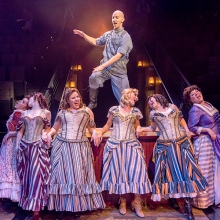Filichia Features: How about Cyrano?
Filichia Features: How about Cyrano?
 Broadway will soon have a new Cyrano de Bergerac. But perhaps you can give the world a new Cyrano – meaning the excellent 1973 musical version.
Broadway will soon have a new Cyrano de Bergerac. But perhaps you can give the world a new Cyrano – meaning the excellent 1973 musical version.
Granted, its 49-performance run on Broadway was disappointing, but that had more to do with its being under-financed; a longer-than-planned Boston tryout was costly, too.
And yet, Christopher Plummer won a Tony for playing the title character. He sang songs by noted film composer Michael J. Lewis and Anthony Burgess. Yes, the latter was the author of the notorious A Clockwork Orange, in which sadist Alex DeLarge terrorized London.
Actually, as we’ll see, Cyrano and Alex had a little in common.
The show begins at a theatrical performance in Paris. The first words come from a vendor selling “oranges, pomegranates and lemons.” And you thought that a merchant coming down the aisle to sell snacks in a theater was a recent phenomenon! Nope, here we are in 1632 and playgoers are already buying munchies.
If Cyrano were around, he might buy some fruit to throw at the show’s leading man. He can’t stand the actor, and recently forbade him from appearing on stage. How’s that for hubris?
The actor takes the stage, anyway, and soon there is a powerful off-stage voice telling him to leave. Afterward, Burgess’ stage direction says, “Cyrano leaps out of the dark, bounds onto a chair, his hat cocked for battle, his mustache bristling, and his nose most formidable.”
Cyrano. Photo courtesy of Toho, HoriPro and Fuji Television.
Now that’s an entrance! Have you a rugged actor who can play him?
He’s got to have a good deal of panache – defined as an equal mixture of flamboyance (but in a masculine way) and courage.
Almost every theater company has an actor with an ego as big as Rhode Island -- which may be a small state, but is still pretty big for an ego. Here’s the role for him: someone who can unequivocally state “I want the stage rid of this goiter, abscess, tumor and hemorrhoid” with such power that the very frightened actor takes his leave.
Although this is quite a radical and anti-social act, Cyrano ameliorates it a bit by personally giving back each theatergoer his money. Granted, one man’s flop is another man’s hit, but at least we see that Cyrano is willing to literally pay a great price to uphold what he believes to be artistic standards.
But what makes a man so vituperative? How can we get behind him? The answer is as plain as the nose on his face: an enormous nose, in fact, that’s made him self-conscious. One can only imagine the schoolyard taunts that Cyrano had to endure from the first day of école. Today, a kid’s parents would have him at a plastic surgeon before you could say “a nose is a nose is a nose,” but in 1632, the first rhinoplasty was still 255 years away. Anyone who’s sympathized with Elphaba can commiserate here, too.
Are you worried “Where’m I gonna get a colossus of a proboscis? Even if I can, will it fit my Cyrano?” This could be a challenge to a make-up artist who believes that the nose should be so large that it will take up a good deal of the prop table.
Does it? When Gabriel Barre played Cyrano at the Shakespeare Theatre of New Jersey in 1998, he did not wear a nose-piece at all, for nature had already provided him with an ample one. If your leading man has been nasally endowed, consider having him do it as is.
No question that this nose has made Cyrano an overachiever – and over-reactor. When a man dares to point out that Cyrano’s nose is “large,” our hero delivers a song that points out the limitations of the man’s vocabulary. Lewis and Burgess wrote a terrific piece of patter here.
Cyrano’s a poet, too, and says matter-of-factly that he’ll now improvise a poem while sword-fighting; on the poem’s last line, he promises, he’ll provide the climax of the fight. And darn if he doesn’t kill the guy just as he wraps up the last line of verse. Here the pen is just as mighty as the sword – which means that your leading man will have to wield a good sword, too.
See? He’s not so different from Burgess’ Alex DeLarge who enjoyed pummeling people while warbling “Singin’ in the Rain.” But we do feel a little sympathy for him when he says one reason he hates the banished actor is that the man sexually harassed Roxana. She’s his distant cousin with whom he’d like to be less distant, for he’s deeply in love with her. A friend urges him to go to her house and “Tell Her” (a lovely, lilting melody), but Cyrano says he can’t because “this nose precedes me everywhere.”
And yet, when Roxana merely extends an invitation for him to visit her, Cyrano reads too much into it and sings his joy in the spirited “From Now Till Forever.” A good drama builds up a guy’s hopes so that when they’re dashed – and they will be – he’ll have a much deeper height from which to fall.
That won’t happen right away, for in the charm song “Bergerac” Roxana sings about the time that she and Cyrano spent together as children. Cyrano joins in and a good time is had by both. If Cyrano were not so smitten, however, he might see her fond memories as a warning sign: they all suggest friendship.
And because Roxana regards him as such a friend, she asks that he keep an eye on Christian, the handsome man in his regiment whom she loves. When Cyrano agrees, we know he really loves her: he’ll make this sacrifice.
CYRANO Original Cast Recording
Have you a young, handsome but inexperienced actor in your midst? Christian is an ideal role with which to break in a novice. He’s supposed to be awkward and tongue-tied, so an actor who’s still finding his way and needs more stage time will find this part a perfect one to help him become more seasoned.
If your Christian is natively shy, so much the better. He’s incapable of expressing himself, which is why Cyrano offers to provide the love-letter writing for him. Your Cyrano must stress that he is satisfied to have this outlet to show Roxana how he feels – even if she doesn’t know it’s he.
Encourage your Cyrano to work hard to replicate Christian’s voice as much as possible. He must pretend to be the young man in a nighttime scene: Roxana is on a balcony, and Christian is ostensibly below delivering romantic talk. When he falters, Cyrano must take over and convince Roxana that Christian is speaking.
Roxana’s response to “Christian” is “You Have Made Me Love,” the most glorious Broadway aria that no one knows. Saunter over to the Cyrano webpage provided here and listen to the 30-second preview. What’s there is only the B-section, which is quite beautiful, but wait until you hear the A’s! The soprano you cast as Roxana will be so grateful to you for introducing her to this bolt-of-lightning ballad that she’ll thank you “From Now Till Forever.”
Both songs are featured in the overture, which is superb. Excellent musicians will revel in playing what is arguably the best unknown overture of the last 50 Broadway seasons. That’s quite a statement, to be sure, but once again, head to the webpage for the 30-second preview. Now isn’t it stirring and majestic? And to think that what you’ve heard is only one-eighth of it; the other 88% is just as impressive. It’s music that might have even straightened out Alex DeLarge.

Read all of Filichia Features.
You may e-mail Peter at pfilichia@aol.com. Check out his weekly column each Tuesday at www.masterworksbroadway.com and each Friday at www.kritzerland.com. His newest book, Broadway Musical MVPs, 1960-2010: The Most Valuable Players of the Past 50 Seasons, is now available through Applause Books and at www.amazon.com.
Share
Callboard
-
Shake and shimmy it with the #Hairspray20Challenge! Join MTI and Broadway Media in celebrating 20 years of #Hairspray. Duet this here or find us on TikTok! Special thanks to @broadwaymedia and @jammyprod. Choreography Guides are a licensor official resource that provides step-by-step instruction from Broadway and professional choreographers for your productions! Visit @broadwaymedia to learn more. #mtishows #youcantstopthebeat #hairspraymusical #goodmorningbaltimore
View on Instagram



























